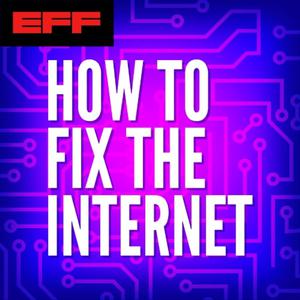
How to Fix the Internet
Electronic Frontier Foundation (EFF)
The internet is broken—but it doesn’t have to be. If you’re concerned about how surveillance, online advertising, and automated content moderation are hurting us online and offline, the Electronic Frontier Foundation’s How to Fix the Internet podcast offers a better way forward. EFF has been defending your rights online for over thirty years and is behind many of the biggest digital rights protections since the invention of the internet. Through curious conversations with some of the leading minds in law and technology, this podcast explores creative solutions to some of today’s biggest tech challenges. Hosted by EFF Executive Director Cindy Cohn and EFF Associate Director of Digital Strategy Jason Kelley, How to Fix the Internet will help you become deeply informed on vital technology issues as we work to build a better technological future together.
- 43 minutes 51 secondsRerelease - So You Think You're a Critical Thinker
This episode was first released on March 21, 2023.
The promise of the internet was that it would be a tool to melt barriers and aid truth-seekers everywhere. But it feels like polarization has worsened in recent years, and more internet users are being misled into embracing conspiracies and cults.
From QAnon to anti-vax screeds to talk of an Illuminati bunker beneath Denver International Airport, Alice Marwick has heard it all. She has spent years researching some dark corners of the online experience: the spread of conspiracy theories and disinformation. She says many people see conspiracy theories as participatory ways to be active in political and social systems from which they feel left out, building upon beliefs they already harbor to weave intricate and entirely false narratives.
Marwick speaks with EFF’s Cindy Cohn and Jason Kelley about finding ways to identify and leverage people’s commonalities to stem this flood of disinformation while ensuring that the most marginalized and vulnerable internet users are still empowered to speak out.
In this episode you’ll learn about:
- Why seemingly ludicrous conspiracy theories get so many views and followers
- How disinformation is tied to personal identity and feelings of marginalization and disenfranchisement
- When fact-checking does and doesn’t work
- Thinking about online privacy as a political and structural issue rather than something that can be solved by individual action
Alice Marwick is director of research at Data & Society. Previously she was an Associate Professor in the Department of Communication and cofounder and Principal Researcher at the Center for Information, Technology and Public Life at the University of North Carolina, Chapel Hill. She researches the social, political, and cultural implications of popular social media technologies. In 2017, she co-authored Media Manipulation and Disinformation Online (Data & Society), a flagship report examining far-right online subcultures’ use of social media to spread disinformation, for which she was named one of Foreign Policy magazine’s 2017 Global Thinkers. She is the author of Status Update: Celebrity, Publicity and Branding in the Social Media Age (Yale 2013), an ethnographic study of the San Francisco tech scene which examines how people seek social status through online visibility, and co-editor of The Sage Handbook of Social Media (Sage 2017). Her forthcoming book, The Private is Political (Yale 2023), examines how the networked nature of online privacy disproportionately impacts marginalized individuals in terms of gender, race, and socio-economic status. She earned a political science and women's studies bachelor's degree from Wellesley College, a Master of Arts in communication from the University of Washington, and a PhD in media, culture and communication from New York University.
This podcast is licensed Creative Commons Attribution 4.0 International, and includes the following music licensed Creative Commons Attribution 3.0 Unported by their creators:
http://dig.ccmixter.org/files/djlang59/59729
Probably Shouldn’t by J.Lang (c) copyright 2012 Licensed under a Creative Commons Attribution (3.0) license. Ft: Mr_Yesterday__________________________________
http://dig.ccmixter.org/files/airtone/58703
CommonGround by airtone (c) copyright 2019 Licensed under a Creative Commons Attribution (3.0) Ft: simonlittlefield
__________________________________
Additional beds and alternate theme remixes by Gaëtan Harris
11 October 2024, 7:00 am - 39 minutes 15 secondsFighting Enshittification
The early internet had a lot of “technological self-determination" — you could opt out of things, protect your privacy, control your experience. The problem was that it took a fair amount of technical skill to exercise that self-determination. But what if it didn’t? What if the benefits of online privacy, security, interoperability, and free speech were more evenly distributed among all internet users?
This is the future that award-winning author and EFF Special Advisor Cory Doctorow wants us to fight for. His term “enshittification” — a downward spiral in which online platforms trap users and business customers alike, treating them more and more like commodities while providing less and less value — was selected by the American Dialect Society as its 2023 Word of the Year. But, he tells EFF’s Cindy Cohn and Jason Kelley, enshittification analysis also identifies the forces that used to make companies treat us better, helping us find ways to break the cycle and climb toward a better future.
In this episode you’ll learn about:
- Why “intellectual property” is a misnomer, and how the law has been abused to eliminate protections for society
- How the tech sector’s consolidation into a single lobbying voice helped bulldoze the measures that used to check companies’ worst impulses
- Why recent antitrust actions provide a glimmer of hope that megacompanies can still be forced to do better for users
- Why tech workers’ labor rights are important to the fight for a better internet
- How legislative and legal losses can still be opportunities for future change
Cory Doctorow is an award-winning science fiction author, activist, journalist and blogger, and a Special Advisor to EFF. He is the editor of Pluralistic and the author of novels including “The Bezzle” (2024), “The Lost Cause” (2023), “Attack Surface” (2020), and “Walkaway” (2017); young adult novels including “Homeland” (2013) and “Little Brother” (2008); and nonfiction books including “The Internet Con: How to Seize the Means of Computation” (2023) and “How to Destroy Surveillance Capitalism” (2021). He is EFF's former European director and co-founded the UK Open Rights Group. Born in Toronto, Canada, he now lives in Los Angeles.
2 July 2024, 7:05 am - 38 minutes 19 secondsAI in Kitopia
Artificial intelligence will neither solve all our problems nor likely destroy the world, but it could help make our lives better if it’s both transparent enough for everyone to understand and available for everyone to use in ways that augment us and advance our goals — not for corporations or government to extract something from us and exert power over us. Imagine a future, for example, in which AI is a readily available tool for helping people communicate across language barriers, or for helping vision- or hearing-impaired people connect better with the world.
This is the future that Kit Walsh, EFF’s Director of Artificial Intelligence & Access to Knowledge Legal Projects, and EFF Senior Staff Technologist Jacob Hoffman-Andrews, are working to bring about. They join EFF’s Cindy Cohn and Jason Kelley to discuss how AI shouldn’t be a tool cash in, or to classify people for favor or disfavor, but instead to engage with technology and information in ways that advance us all.
In this episode you’ll learn about:
- The dangers in using AI to determine who law enforcement investigates, who gets housing or mortgages, who gets jobs, and other decisions that affect people’s lives and freedoms.
- How "moral crumple zones” in technological systems can divert responsibility and accountability from those deploying the tech.
- Why transparency and openness of AI systems — including training AI on consensually obtained, publicly visible data — is so important to ensure systems are developed without bias and to everyone’s benefit.
- Why “watermarking” probably isn’t a solution to AI-generated disinformation.
Kit Walsh is a senior staff attorney at EFF, serving as Director of Artificial Intelligence & Access to Knowledge Legal Projects. She has worked for years on issues of free speech, net neutrality, copyright, coders' rights, and other issues that relate to freedom of expression and access to knowledge, supporting the rights of political protesters, journalists, remix artists, and technologists to agitate for social change and to express themselves through their stories and ideas. Before joining EFF, Kit led the civil liberties and patent practice areas at the Cyberlaw Clinic, part of Harvard University's Berkman Klein Center for Internet and Society; earlier, she worked at the law firm of Wolf, Greenfield & Sacks, litigating patent, trademark, and copyright cases in courts across the country. Kit holds a J.D. from Harvard Law School and a B.S. in neuroscience from MIT, where she studied brain-computer interfaces and designed cyborgs and artificial bacteria.
Jacob Hoffman-Andrews is a senior staff technologist at EFF, where he is lead developer on Let's Encrypt, the free and automated Certificate Authority; he also works on EFF's Encrypt the Web initiative and helps maintain the HTTPS Everywhere browser extension. Before working at EFF, Jacob was on Twitter's anti-spam and security teams. On the security team, he implemented HTTPS-by-default with forward secrecy, key pinning, HSTS, and CSP; on the anti-spam team, he deployed new machine-learned models to detect and block spam in real-time. Earlier, he worked on Google’s maps, transit, and shopping teams.
18 June 2024, 7:05 am - 38 minutes 38 secondsAI on the Artist’s Palette
Collaging, remixing, sampling—art always has been more than the sum of its parts, a synthesis of elements and ideas that produces something new and thought-provoking. Technology has enabled and advanced this enormously, letting us access and manipulate information and images in ways that would’ve been unimaginable just a few decades ago.
For Nettrice Gaskins, this is an essential part of the African American experience: The ability to take whatever is at hand—from food to clothes to music to visual art—and combine it with life experience to adapt it into something new and original. She joins EFF’s Cindy Cohn and Jason Kelley to discuss how she takes this approach in applying artificial intelligence to her own artwork, expanding the boundaries of Black artistic thought.
In this episode you’ll learn about:
- Why making art with AI is about much more than just typing a prompt and hitting a button
- How hip-hop music and culture was an early example of technology changing the state of Black art
- Why the concept of fair use in intellectual property law is crucial to the artistic process
- How biases in machine learning training data can affect art
- Why new tools can never replace the mind of a live, experienced artist
Dr. Nettrice R. Gaskins is a digital artist, academic, cultural critic, and advocate of STEAM (science, technology, engineering, arts, and math) fields whose work she explores "techno-vernacular creativity" and Afrofuturism. She teaches, writes, "fabs,” and makes art using algorithms and machine learning. She has taught multimedia, visual art, and computer science with high school students, and now is assistant director of the Lesley STEAM Learning Lab at Lesley University. She was a 2021 Ford Global Fellow, serves as an advisory board member for the School of Literature, Media, and Communication at Georgia Tech, and is the author of “Techno-Vernacular Creativity and Innovation” (2021). She earned a BFA in Computer Graphics with honors from Pratt Institute in 1992; an MFA in Art and Technology from the School of the Art Institute of Chicago in 1994; and a doctorate in Digital Media from Georgia Tech in 2014.
MUSIC CREDITS
Xena's Kiss / Medea's Kiss by mwic (c) copyright 2018 Licensed under a Creative Commons Attribution (3.0) license.
_________________
lostTrack by Airtone (c) copyright 2019 Licensed under a Creative Commons Attribution (3.0) license. Ft. mwic
4 June 2024, 7:05 am - 35 minutes 47 secondsChronicling Online Communities
From Napster to YouTube, some of the most important and controversial uses of the internet have been about building community: connecting people all over the world who share similar interests, tastes, views, and concerns. Big corporations try to co-opt and control these communities, and politicians often promote scary narratives about technology’s dangerous influences, but users have pushed back against monopoly and rhetoric to find new ways to connect with each other.
Alex Winter is a leading documentarian of the evolution of internet communities. He joins EFF’s Cindy Cohn and Jason Kelley to discuss the harms of behavioral advertising, what algorithms can and can’t be blamed for, and promoting the kind of digital literacy that can bring about a better internet—and a better world—for all of us.
In this episode you’ll learn about:
- Debunking the monopolistic myth that communicating and sharing data is theft.
- Demystifying artificial intelligence so that it’s no longer a “black box” impervious to improvement.
- Decentralizing and democratizing the internet so more, diverse people can push technology, online communities, and our world forward.
- Finding a nuanced balance between free speech and harm mitigation in social media.
- Breaking corporations’ addiction to advertising revenue derived from promoting disinformation.
Alex Winter is a director, writer and actor who has worked across film, television and theater. Perhaps best known on screen for “Bill & Ted’s Excellent Adventure” (1989) and its sequels as well as “The Lost Boys” (1987), “Destroy All Neighbors” (2024) and other films, he has directed documentaries including “Downloaded” (2013) about the Napster revolution; “Deep Web” (2015) about the online black market Silk Road and the trial of its creator Ross Ulbricht; “Trust Machine” (2018) about the rise of bitcoin and the blockchain; and “The YouTube Effect” (2022). He also has directed critically acclaimed documentaries about musician Frank Zappa and about the Panama Papers, the biggest global corruption scandal in history and the journalists who worked in secret and at great risk to break the story.
Music credits:
21 May 2024, 7:05 am - 33 minutes 11 secondsBuilding a Tactile Internet
Blind and low-vision people have experienced remarkable gains in information literacy because of digital technologies, like being able to access an online library offering more than 1.2 million books that can be translated into text-to-speech or digital Braille. But it can be a lot harder to come by an accessible map of a neighborhood they want to visit, or any simple diagram, due to limited availability of tactile graphics equipment, design inaccessibility, and publishing practices.
Chancey Fleet wants a technological future that’s more organically attuned to people’s needs, which requires including people with disabilities in every step of the development and deployment process. She speaks with EFF’s Cindy Cohn and Jason Kelley about building an internet that’s just and useful for all, and why this must include giving blind and low-vision people the discretion to decide when and how to engage artificial intelligence tools to solve accessibility problems and surmount barriers.
In this episode you’ll learn about:
- The importance of creating an internet that’s not text-only, but that incorporates tactile images and other technology to give everyone a richer, more fulfilling experience.
- Why AI-powered visual description apps still need human auditing.
- How inclusiveness in tech development is always a work in progress.
- Why we must prepare people with the self-confidence, literacy, and low-tech skills they need to get everything they can out of even the most optimally designed technology.
- Making it easier for everyone to travel the two-way street between enjoyment and productivity online.
Chancey Fleet’s writing, organizing and advocacy explores how cloud-connected accessibility tools benefit and harm, empower and expose communities of disability. She is the Assistive Technology Coordinator at the New York Public Library’s Andrew Heiskell Braille and Talking Book Library, where she founded and maintains the Dimensions Project, a free open lab for the exploration and creation of accessible images, models and data representations through tactile graphics, 3D models and nonvisual approaches to coding, CAD and “visual” arts. She is a former fellow and current affiliate-in-residence at Data & Society; she is president of the National Federation of the Blind’s Assistive Technology Trainers Division; and she was recognized as a 2017 Library Journal Mover and Shaker.
Music credits:
Probably Shouldn't by J.Lang (c) copyright 2019 Licensed under a Creative Commons Attribution (3.0) license. Ft: Mr_Yesterday
commonGround by airtone (c) copyright 2018 Licensed under a Creative Commons Attribution Noncommercial (3.0) license.
Klaus by Skill_Borrower (c) copyright 2013 Licensed under a Creative Commons Attribution (3.0) license. Ft: Klaus_Neumaier
Chrome Cactus by Martijn de Boer (NiGiD) (c) copyright 2020 Licensed under a Creative Commons Attribution Noncommercial (3.0) license. Ft: Javolenus
7 May 2024, 7:05 am - 34 minutes 53 secondsRight to Repair Catches the Car
If you buy something—a refrigerator, a car, a tractor, a wheelchair, or a phone—but you can't have the information or parts to fix or modify it, is it really yours? The right to repair movement is based on the belief that you should have the right to use and fix your stuff as you see fit, a philosophy that resonates especially in economically trying times, when people can’t afford to just throw away and replace things.
Companies for decades have been tightening their stranglehold on the information and the parts that let owners or independent repair shops fix things, but the pendulum is starting to swing back: New York, Minnesota, California, and Colorado have passed right to repair laws, and it’s on the legislative agenda in dozens of other states. Gay Gordon-Byrne is executive director of The Repair Association, one of the major forces pushing for more and stronger state laws, and for federal reforms as well. She joins EFF’s Cindy Cohn and Jason Kelley to discuss this pivotal moment in the fight for consumers to have the right to products that are repairable and reusable.
In this episode you’ll learn about:
- Why our “planned obsolescence” throwaway culture doesn’t have to be, and shouldn’t be, a technology status quo.
- The harm done by “parts pairing:” software barriers used by manufacturers to keep people from installing replacement parts.
- Why one major manufacturer put out a user manual in France, but not in other countries including the United States.
- How expanded right to repair protections could bring a flood of new local small-business jobs while reducing waste.
- The power of uniting disparate voices—farmers, drivers, consumers, hackers, and tinkerers—into a single chorus that can’t be ignored.
Gay Gordon-Byrne has been executive director of The Repair Association—formerly known as The Digital Right to Repair Coalition—since its founding in 2013, helping lead the fight for the right to repair in Congress and state legislatures. Their credo: If you bought it, you should own it and have the right to use it, modify it, and repair it whenever, wherever, and however you want. Earlier, she had a 40-year career as a vendor, lessor, and used equipment dealer for large commercial IT users; she is the author of "Buying, Supporting and Maintaining Software and Equipment - an IT Manager's Guide to Controlling the Product Lifecycle” (2014), and a Colgate University alumna.
MUSIC CREDITS
23 April 2024, 7:05 am - 38 minutes 37 secondsAnti-Trust/Pro-Internet
Imagine an internet in which economic power is more broadly distributed, so that more people can build and maintain small businesses online to make good livings. In this world, the behavioral advertising that has made the internet into a giant surveillance tool would be banned, so people could share more equally in the riches without surrendering their privacy.
That’s the world Tim Wu envisions as he teaches and shapes policy on the revitalization of American antitrust law and the growing power of big tech platforms. He joins EFF’s Cindy Cohn and Jason Kelley to discuss using the law to counterbalance the market’s worst instincts, in order to create an internet focused more on improving people’s lives than on meaningless revenue generation.
In this episode you’ll learn about:
- Getting a better “deal” in trading some of your data for connectedness.
- Building corporate structures that do a better job of balancing the public good with private profits.
- Creating a healthier online ecosystem with corporate “quarantines” to prevent a handful of gigantic companies from dominating the entire internet.
- Nurturing actual innovation of products and services online, not just newer price models.
Timothy Wu is the Julius Silver Professor of Law, Science and Technology at Columbia Law School, where he has served on the faculty since 2006. First known for coining the term “net neutrality” in 2002, he served in President Joe Biden’s White House as special assistant to the President for technology and competition policy from 2021 to 2023; he also had worked on competition policy for the National Economic Council during the last year of President Barack Obama’s administration. Earlier, he worked in antitrust enforcement at the Federal Trade Commission and served as enforcement counsel in the New York Attorney General’s Office. His books include “The Curse of Bigness: Antitrust in the New Gilded Age” (2018), "The Attention Merchants: The Epic Scramble to Get Inside Our Heads” (2016), “The Master Switch: The Rise and Fall of Information Empires” (2010), and “Who Controls the Internet? Illusions of a Borderless World” (2006).
MUSIC CREDITS
_________________
9 April 2024, 7:05 am - 36 minutes 28 secondsAbout Face (Recognition)
Is your face truly your own, or is it a commodity to be sold, a weapon to be used against you? A company called Clearview AI has scraped the internet to gather (without consent) 30 billion images to support a tool that lets users identify people by picture alone. Though it’s primarily used by law enforcement, should we have to worry that the eavesdropper at the next restaurant table, or the creep who’s bothering you in the bar, or the protestor outside the abortion clinic can surreptitiously snap a pic of you, upload it, and use it to identify you, where you live and work, your social media accounts, and more?
New York Times reporter Kashmir Hill has been writing about the intersection of privacy and technology for well over a decade; her book about Clearview AI’s rise and practices was published last fall. She speaks with EFF’s Cindy Cohn and Jason Kelley about how face recognition technology’s rapid evolution may have outpaced ethics and regulations, and where we might go from here.
In this episode, you’ll learn about:
- The difficulty of anticipating how information that you freely share might be used against you as technology advances.
- How the all-consuming pursuit of “technical sweetness” — the alluring sensation of neatly and functionally solving a puzzle — can blind tech developers to the implications of that tech’s use.
- The racial biases that were built into many face recognition technologies.
- How one state's 2008 law has effectively curbed how face recognition technology is used there, perhaps creating a model for other states or Congress to follow.
Kashmir Hill is a New York Times tech reporter who writes about the unexpected and sometimes ominous ways technology is changing our lives, particularly when it comes to our privacy. Her book, “Your Face Belongs To Us” (2023), details how Clearview AI gave facial recognition to law enforcement, billionaires, and businesses, threatening to end privacy as we know it. She joined The Times in 2019 after having worked at Gizmodo Media Group, Fusion, Forbes Magazine and Above the Law. Her writing has appeared in The New Yorker and The Washington Post. She has degrees from Duke University and New York University, where she studied journalism.
This podcast is licensed Creative Commons Attribution 4.0 International, and includes music licensed Creative Commons Attribution 3.0 Unported by their creators. This episode features:
26 March 2024, 7:05 am - 36 minutes 39 seconds"I-Squared" Governance
Imagine a world in which the internet is first and foremost about empowering people, not big corporations and government. In that world, government does “after-action” analyses to make sure its tech regulations are working as intended, recruits experienced technologists as advisors, and enforces real accountability for intelligence and law enforcement programs.
Ron Wyden has spent decades working toward that world, first as a congressman and now as Oregon’s senior U.S. Senator. Long among Congress’ most tech-savvy lawmakers, he helped write the law that shaped and protects the internet as we know it, and he has fought tirelessly against warrantless surveillance of Americans’ telecommunications data. Wyden speaks with EFF’s Cindy Cohn and Jason Kelley about his “I squared” —individuals and innovation—legislative approach to foster an internet that benefits everyone.
In this episode you’ll learn about:
- How a lot of the worrisome online content that critics blame on Section 230 is actually protected by the First Amendment
- Requiring intelligence and law enforcement agencies to get warrants before obtaining Americans’ private telecommunications data
- Why “foreign” is the most important word in “Foreign Intelligence Surveillance Act”
- Making government officials understand national security isn’t heightened by reducing privacy
- Protecting women from having their personal data weaponized against them
U.S. Sen. Ron Wyden, D-OR, has served in the Senate since 1996; he was elected to his current six-year term in 2022. He chairs the Senate Finance Committee, and serves on the Energy and Natural Resources Committee, the Budget Committee, and the Select Committee on Intelligence; he also is the lead Senate Democrat on the Joint Committee on Taxation. His relentless defiance of the national security community's abuse of secrecy forced the declassification of the CIA Inspector General's 9/11 report, shut down the controversial Total Information Awareness program, and put a spotlight on both the Bush and Obama administrations’ reliance on "secret law." In 2006 he introduced the first Senate bill on net neutrality, and in 2011 he was the lone Senator to stand against the Stop Online Piracy Act (SOPA) and the PROTECT IP Act (PIPA), ultimately unsuccessful bills that purportedly were aimed at fighting online piracy but that actually would have caused significant harm to the internet. Earlier, he served from 1981 to 1996 in the House of Representatives, where he co-authored Section 230 of the Communications Decency Act of 1996 —the law that protects Americans’ freedom of expression online by protecting the intermediaries we all rely on.
12 March 2024, 7:05 am - 39 minutes 22 secondsOpen Source Beats Authoritarianism
What if we thought about democracy as a kind of open-source social technology, in which everyone can see the how and why of policy making, and everyone’s concerns and preferences are elicited in a way that respects each person’s community, dignity, and importance?
This is what Audrey Tang has worked toward as Taiwan’s first Digital Minister, a position the free software programmer has held since 2016. She has taken the best of open source and open culture and successfully used them to help reform her country’s government. Tang speaks with EFF’s Cindy Cohn and Jason Kelley about how Taiwan has shown that openness not only works but can outshine more authoritarian competition, wherein governments often lock up data.
In this episode you’ll learn about:
- Using technology including artificial intelligence to help surface our areas of agreement, rather than to identify and exacerbate our differences
- The “radical transparency” of recording and making public every meeting in which a government official takes part, to shed light on the policy-making process
- How Taiwan worked with civil society to ensure that no privacy and human rights were traded away for public health and safety during the COVID-19 pandemic
- Why maintaining credible neutrality from partisan politics and developing strong public and civic digital infrastructure are key to advancing democracy.
Audrey Tang has served as Taiwan's first Digital Minister since 2016, by which time she already was known for revitalizing the computer languages Perl and Haskell, as well as for building the online spreadsheet system EtherCalc in collaboration with Dan Bricklin. In the public sector, she served on the Taiwan National Development Council’s open data committee and basic education curriculum committee and led the country’s first e-Rulemaking project. In the private sector, she worked as a consultant with Apple on computational linguistics, with Oxford University Press on crowd lexicography, and with Socialtext on social interaction design. In the social sector, she actively contributes to g0v (“gov zero”), a vibrant community focusing on creating tools for the civil society, with the call to “fork the government.”
27 February 2024, 8:05 am - More Episodes? Get the App
Your feedback is valuable to us. Should you encounter any bugs, glitches, lack of functionality or other problems, please email us on [email protected] or join Moon.FM Telegram Group where you can talk directly to the dev team who are happy to answer any queries.
 Decoder with Nilay Patel
Decoder with Nilay Patel
 Tech Won't Save Us
Tech Won't Save Us
 Have A Nice Future | WIRED
Have A Nice Future | WIRED
 Hard Fork
Hard Fork
 The 404 Media Podcast
The 404 Media Podcast
 Uncanny Valley | WIRED
Uncanny Valley | WIRED